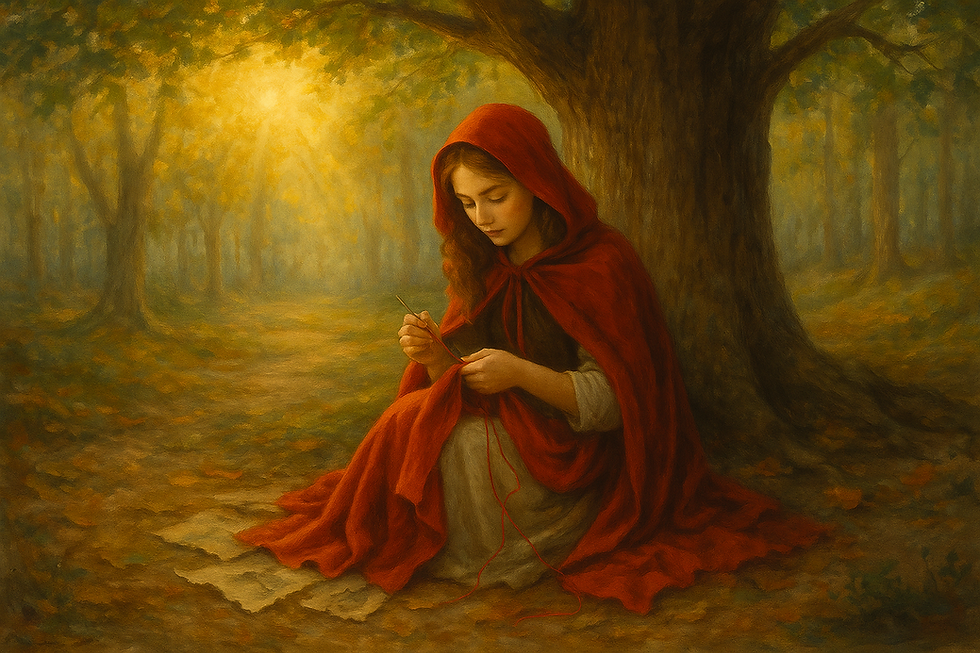The Wolf Beneath the Cloak: Power, Purity, and the Psychological Lure of Being ‘Chosen’
- Renee Spencer

- Aug 2, 2025
- 3 min read
When faith becomes fuel for domination, and how to reclaim it from the jaws of extremism

In the fairy tale of Little Red Riding Hood, the danger wasn’t just the wolf—it was the wolf pretending to be something safe. A grandmother. A protector. Even family. Extremist ideologies do the same. They disguise power-hunger as righteousness. Domination as destiny. Supremacy as spiritual truth.
Across religions—Islam, Judaism, Christianity, and even secular belief systems—the lure of being “chosen,” “pure,” or “set apart” can lead well-meaning people into dangerous territory. In this final blog of our series, we examine the psychological underpinnings of extremist thinking, the ways this cloak of specialness is used to seduce and control, and how we can reclaim spirituality from the wolves who abuse it.
The Seduction of Specialness
There is a deep human longing to be seen, known, and valued. The idea of being chosen—by God, by destiny, by fate—can meet that longing with intoxicating power. It promises clarity in chaos. Belonging in isolation. And most dangerously, superiority in a world of equals.
Extremist movements exploit this need by offering members a role in a divine drama. Whether it’s being God’s last remnant, part of the End Times elect, or defenders of a threatened moral order, the narrative is the same: “You are special. You are under attack. You are justified in fighting back.”
This is not unique to one religion. It is a psychological vulnerability that any ideology can weaponize—religious or secular, spiritual or political.
Purity, Power, and the Cloak of Righteousness
Purity cultures—whether based in theology or ideology—tell people they must remain untainted by “the world.” This often begins with small sacrifices: avoid outsiders, don’t question doctrine, stay within the group. But it can escalate quickly into dangerous exclusionism:
Dehumanising others (infidels, apostates, the unclean).
Suppressing dissent (doubters are weak or traitorous).
Claiming divine sanction for harm (violence as holy war, persecution as purification).
These narratives bear uncanny resemblance to cult dynamics:
The group offers absolute truth.
The leader or ideology is above criticism.
The outside world is evil, dangerous, or deceptive.
Those who leave or resist are attacked or shunned.
In short, the wolf dons the cloak and declares itself the saviour. Purity is a means to power.
The Real Wolf Isn’t Faith — It’s Power-Hunger
Let’s be clear: The danger isn’t the Quran, the Bible, the Torah, or any sacred text. It’s not faith in God or a yearning for moral order. It’s how those things are manipulated by people seeking power.
Authoritarian leaders—whether in cults, churches, mosques, or parliaments—don’t need to believe what they preach. They only need others to believe it. And the most effective way to keep followers obedient is to make them feel special and under threat.
This is how dominionist Christians claim a right to control government.
How radical Jewish settlers claim land through messianic entitlement.
How Islamist extremists justify war through a perverted idea of purity.
How white supremacists co-opt biblical language to preach hate.
How fringe Australian political movements echo this playbook with apocalyptic warnings, divine missions, and imagined enemies.
This is not spirituality. It’s spiritual abuse.
Reclaiming the Cloak: Healthy Spirituality and Resistance
True faith—of any tradition—doesn’t demand domination. It invites transformation. It doesn’t ask us to hate the outsider, but to love the stranger. It doesn’t shield the powerful, but uplifts the oppressed.
Around the world, spiritual leaders and laypeople are reclaiming their traditions:
Muslim scholars challenging jihadist ideology with nonviolent teachings.
Jewish human rights activists calling for justice for Palestinians.
Christian communities centring their work around inclusion, humility, and care for the marginalised.
Interfaith alliances working together to resist extremism and build peace.
These are the ones weaving their cloaks with truth, thread by thread.
Conclusion: The Path Out of the Woods
In the final pages of Little Red Riding Hood, some versions say she sews herself a new cloak. A stronger one. She no longer walks the forest blindly. She listens. She watches for wolves. She trusts her instincts.
Likewise, we must become wise to the ways extremism wraps itself in sacred language. We must learn to recognise when we are being flattered into silence, fear, or complicity.
You don’t have to be religious to see the value in humility, compassion, and critical thinking. And you don’t have to surrender your spiritual heritage to extremists who twist it.
The cloak still belongs to you.
And the forest can still be walked—with courage, awareness, and care.
Comments